
Collective Nouns (Group Nouns) Collective nouns, English vocabulary words, Learn english words
Collective nouns are words that refer to a group of people or things (e.g., team, group, herd). Collective nouns look singular, but they can be treated as singular or plural depending on whether the word refers to the group as a single entity or to its members as individuals.. While some collective nouns (e.g., "pack," "group") can be used.

Collective Noun Definition, List & Examples of Collective Nouns in English • 7ESL
Collective Noun Examples Used in Sentences. Have a look at the following sentences. Tommy was excited to see a herd of elephants on the way to his native place.; The bench of judges gave the verdict on the case.; The kid enjoyed seeing the flock of pigeons take off all at once.; The football team was congratulated by the principal.; The mob was getting crazier with time.

Collective nouns Collective nouns, Reading comprehension lessons, Nouns
The meaning of COLLECTIVE NOUN is a noun such as 'team' or 'flock' that refers to a group of people or things.. 13 Jan. 2023 Siegfried & Roy's streak—one collective noun for a group of tigers; another is ambush—began in 1983 with the acquisition of three white cubs,.
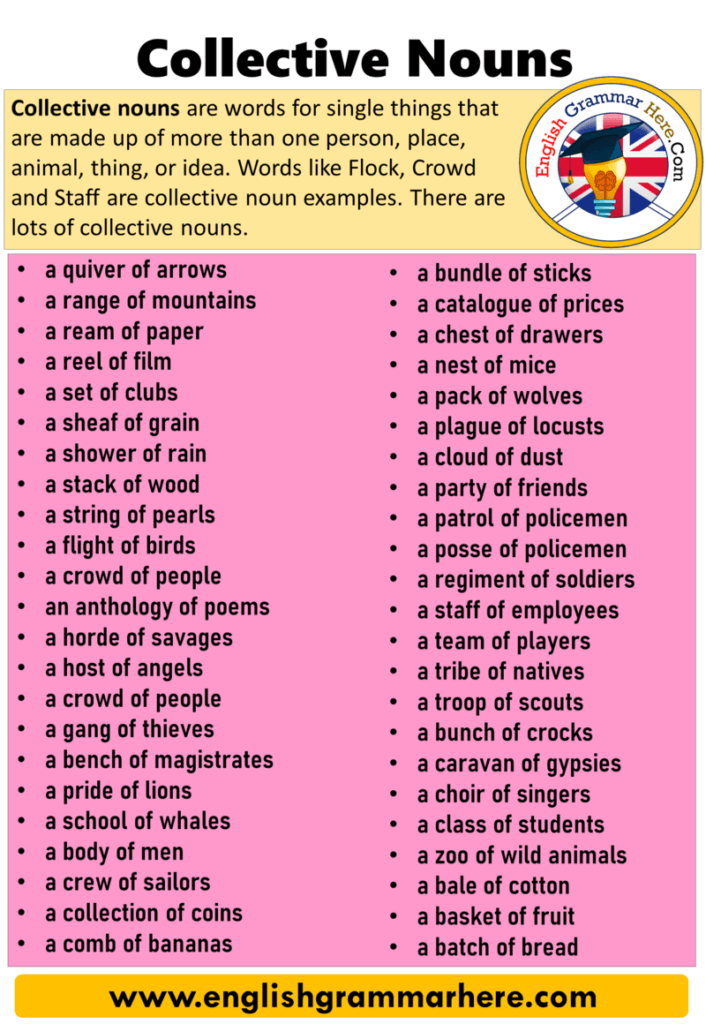
Collective Nouns, Definition and Examples English Grammar Here
Here is a list of collective nouns by subject.. A collective noun is a special kind of noun that refers to a collection of objects—often animals—such as a flock of birds, or a pride of lions.. In the lists which follow, terms marked with a + belong to the 15th-century list of "proper terms" contained in the Book of St Albans.Many of these are fanciful or humorous terms which have never had.
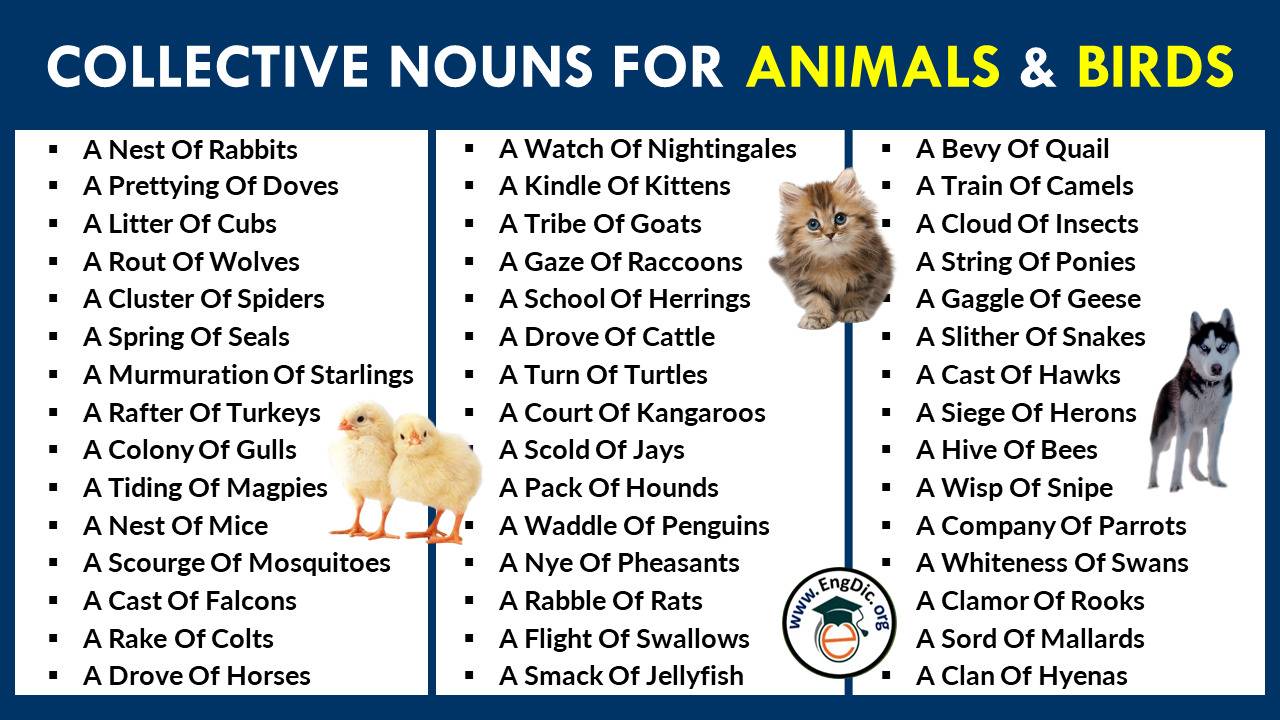
80+ List Of Collective Nouns For Animals And Birds EngDic
As you see, collective nouns can consist of a few people or tens, hundreds or thousands of people: committee, jury, senate, company, audience, police, army. Most collective nouns are groups of people, but some refer to animals or objects, for example: animals: a herd of cows, a flock of sheep. objects: a fleet of ships, a convoy of trucks.

Collective Nouns Herd Agriculture
Collective nouns are singular nouns used to refer a group of persons or objects. Find out how to identify and use collective nouns correctly.

COLLECTIVE NOUNS PICTIONARY worksheet Collective nouns, Nouns, Interactive anchor charts
Here are plural types of collective nouns with examples: Several cows in a herd are stampeding through a field. Three people in an assembly are disagreeing with the decision. Two girls in our family are twins. In these examples, the preposition in denotes that the preceding subjects are a part of the collective noun.

Collective Nouns For Animals Examples
A collective noun is a common noun that names a group of people, creatures, or objects: The audience at the midafternoon showing was especially appreciative of the comedic parts of the movie. Traffic on the road was temporarily stopped by a flock of wild turkeys that was making its way across. Paleontologists found a set of fossils in Argentina.
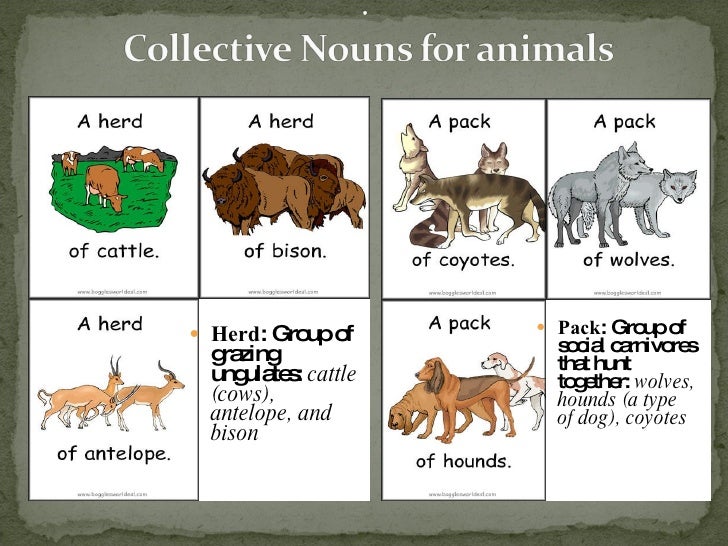
Collective Nouns
Nouns are words that name a person, place, thing, or idea. Collective nouns are nouns that describe a group, for example: class, family, herd, couple. These can also be called group nouns. There are about 200 collective nouns in English. When we use collective nouns, we often say " a group of ________ ," such as a herd of cattle or a clump of.
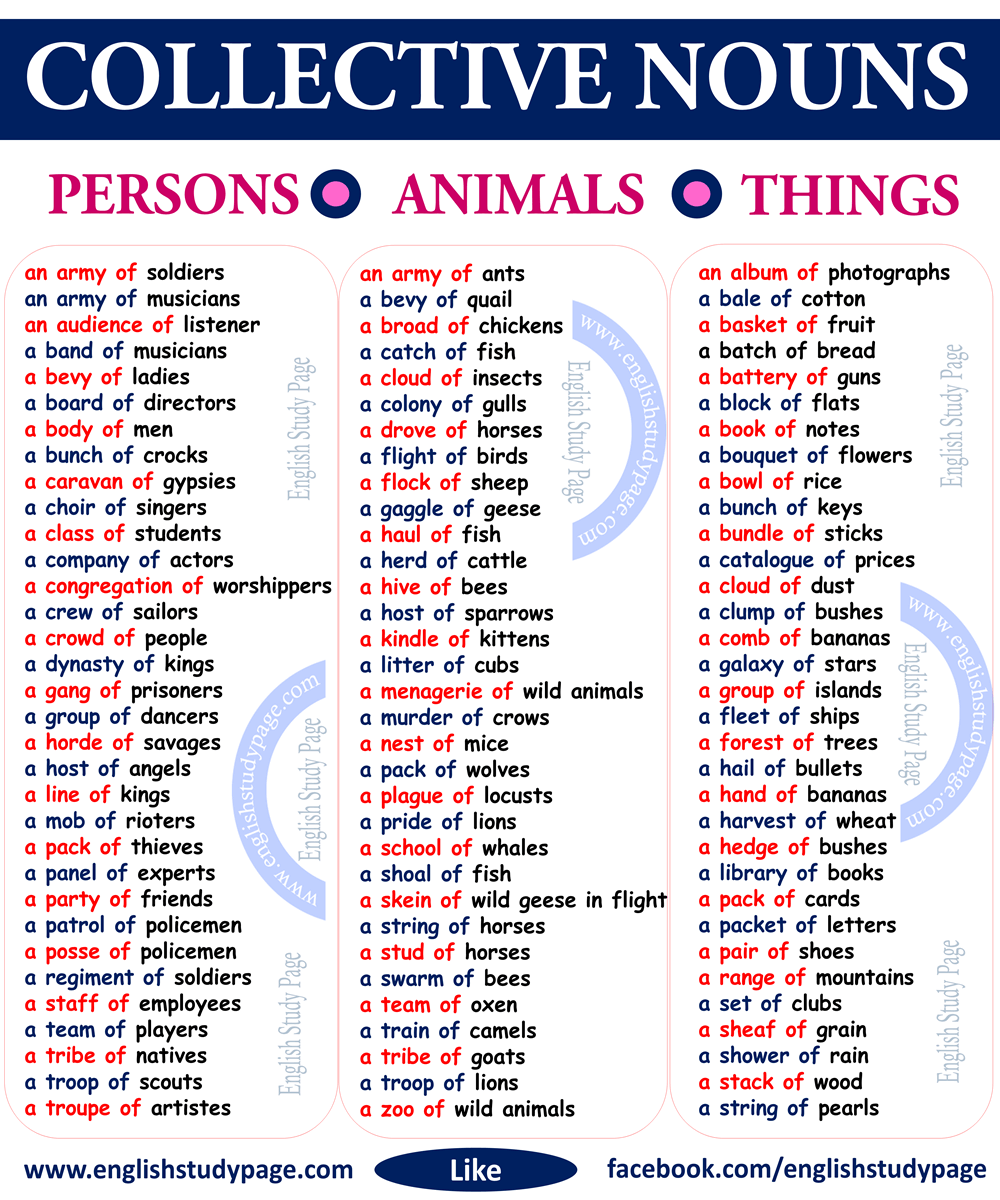
Collective Nouns Singular or Plural? English Study Page
Collective Nouns. Collective nouns are names for a collection or a number of people or things. Words like group, herd, and array are collective noun examples. Here, we'll take a closer look at collective nouns, and provide even more examples, placing them in context so you can gain a greater understanding of how they work.

Animal Group Names 250+ Collective Nouns for Animals Efortless English
A group of snakes is generally a pit, nest, or den, but they're generally thought of as solitary creatures, so collective nouns for specific types of snakes are more fanciful. A "generation of.
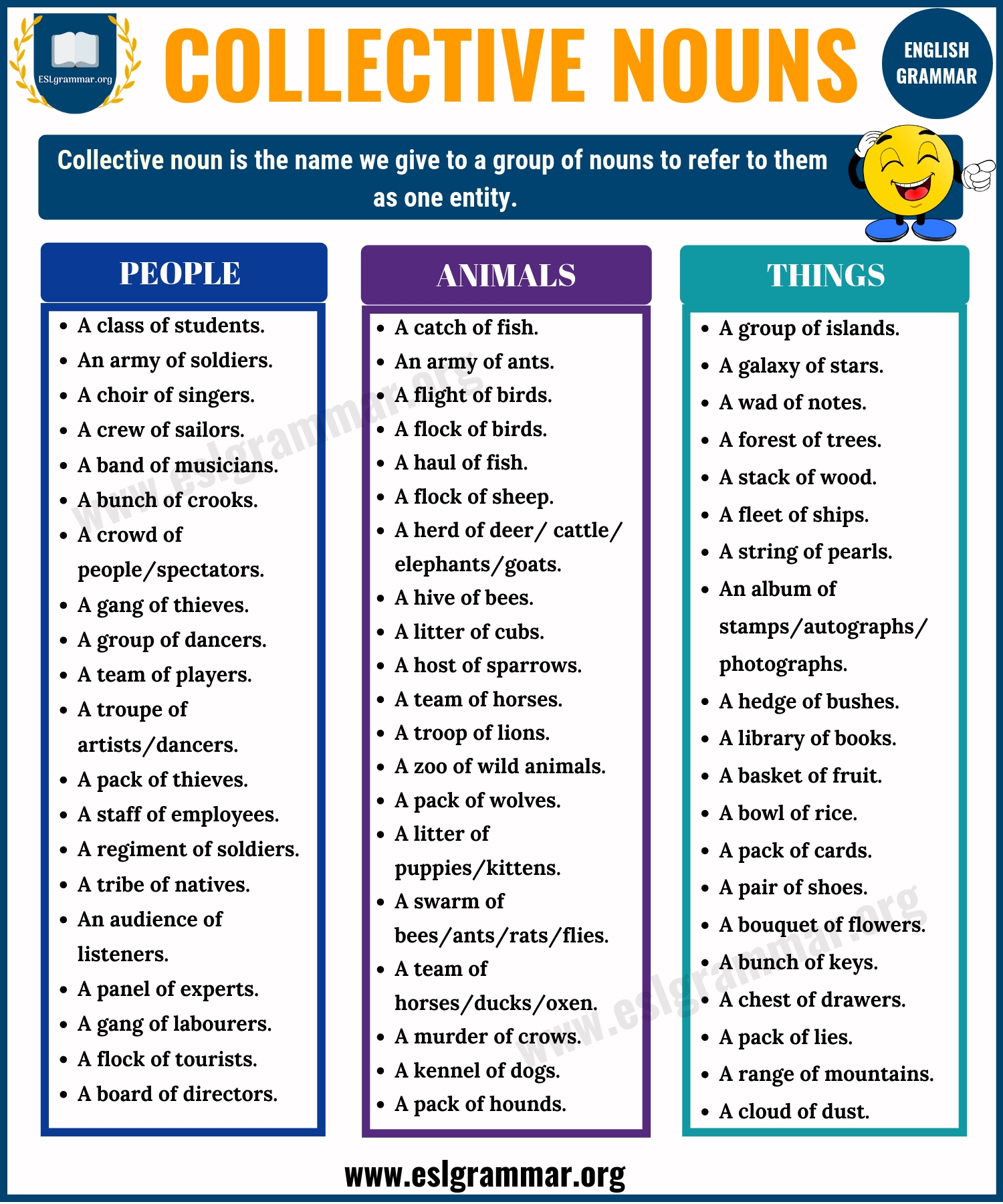
Collective Nouns Definition, Useful List and Examples ESL Grammar
One of our best-known (and easily meme-able) collective nouns is a murder of crows.Unlike many collective nouns, this sense of murder even has enough evidence in print to merit entry into our dictionaries.. This use of murder goes back to the 1400s. There was, at that time, something of a fad for "terms of venery," or names for groups of game animals.. Treatises on hunting and hawking were.

English Detailed Collective Nouns List English Grammar Here 587367976384946400 Collective
Collective Noun Definition. Collective nouns refer to a group of people, animals, or things as a single entity. These nouns are used to describe a collection of individuals or objects that share a common trait or characteristic. For example, a "herd" of cows, a "flock" of birds, and a "team" of players are all collective nouns. Even.
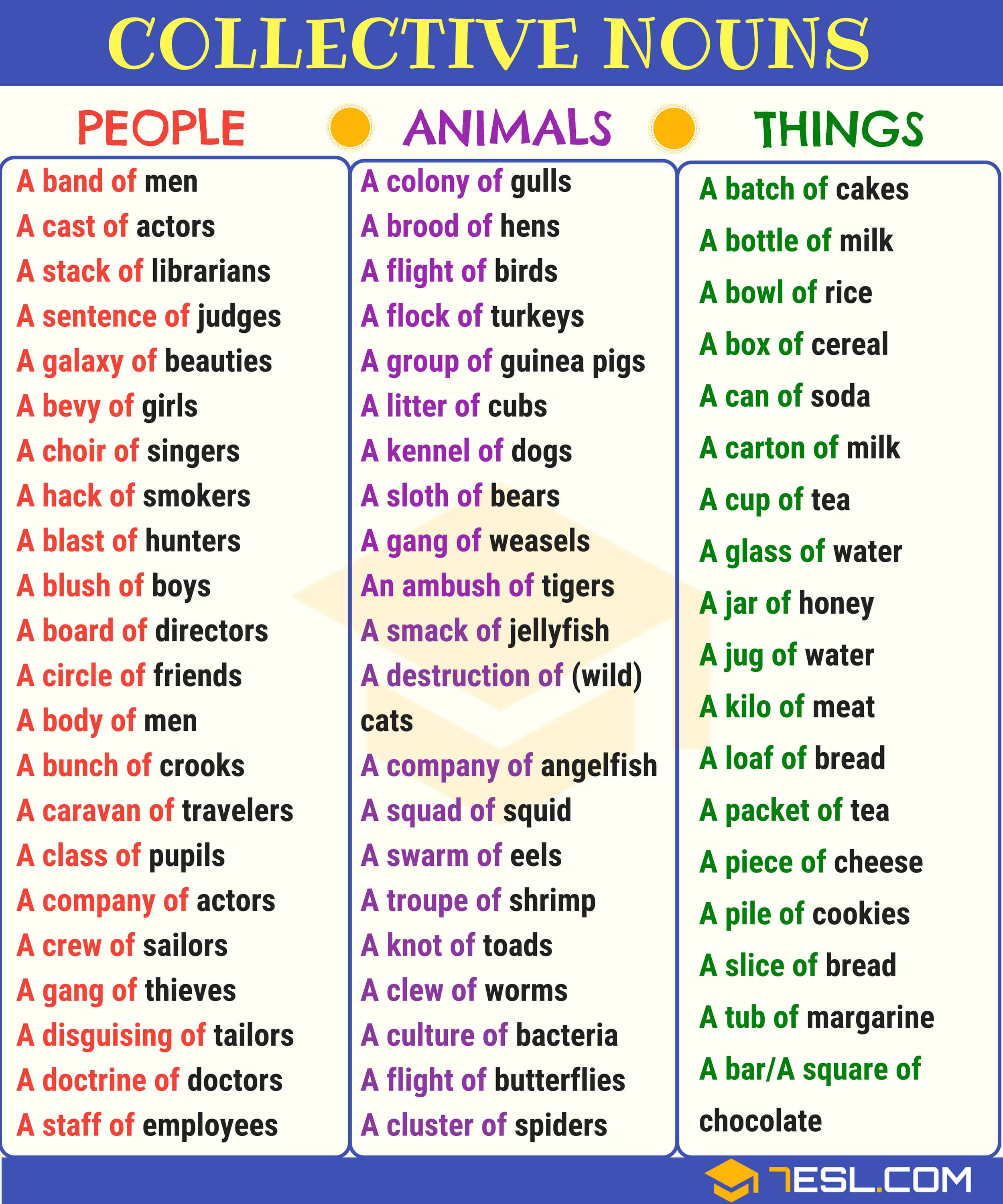
A Guide to Collective Nouns with Useful Collective Noun Examples • 7ESL
A collective noun is a word used to describe a group of people, animals, or things. It is a singular noun that refers to a collection of individuals or objects. To describe a group of animals, the English language offers a plethora of collective nouns, and one of the most commonly used is 'herd'.
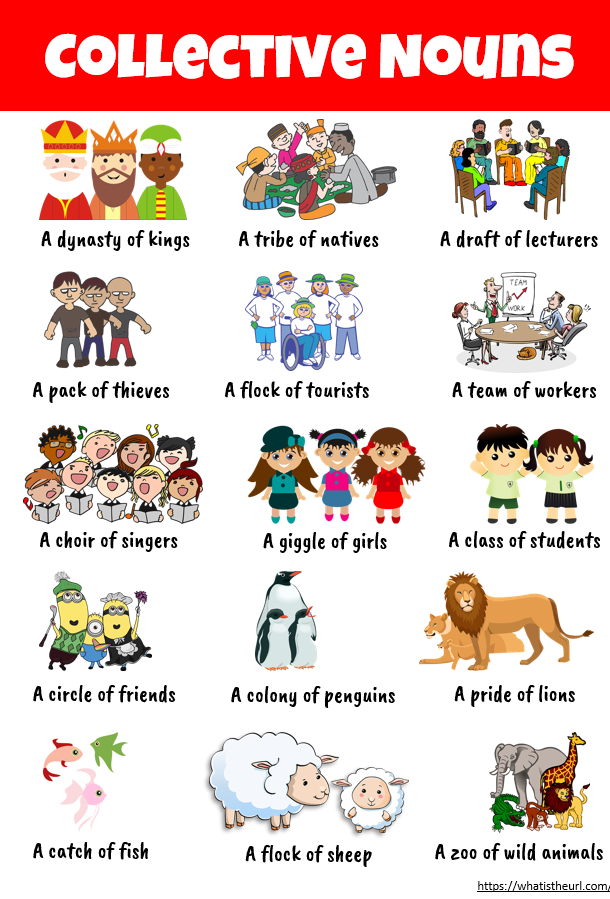
Noun Herders Mastering Collective Nouns in 2023 AtOnce
Collective nouns are singular words that refer to a group or collection of people, animals or things. In British English, most collective nouns can be used with singular and plural verbs. In American English, they are used with singular verbs only. Learn about collective nouns in English online with Lingolia. Then put your knowledge to the test in the free exercises.

Collective Nouns in English English Study Page
A collective noun is a word which we use to define a group or collection of people, animals or things. In the phrase a herd of elephants, the word herd is a collective noun. English has a lot of collective nouns. Don't worry - even native speakers don't know them all! Here are some of the most common: